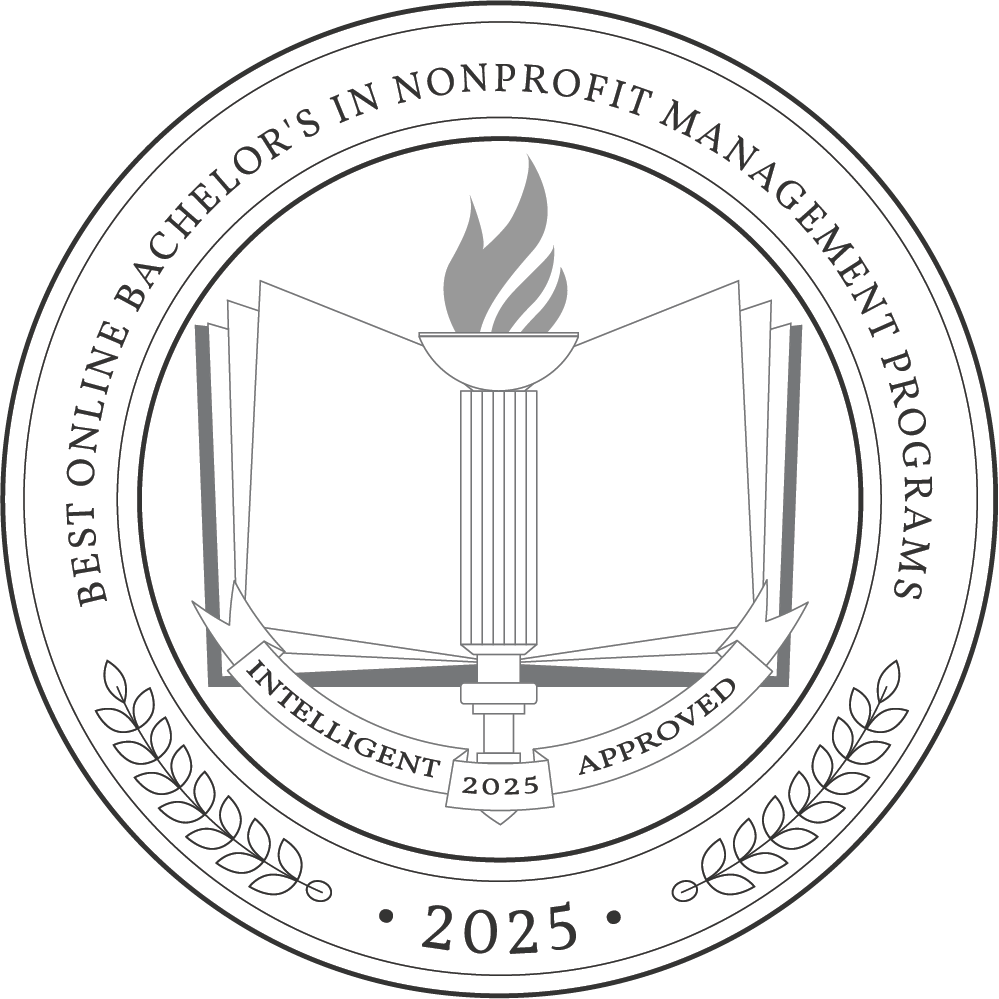Students pursuing an online bachelor’s in nonprofit management degree learn how leadership roles function in nonprofit organizations and what these organizations need to operate effectively. Some graduates go on to serve in executive director or management positions, while others may specialize in volunteer coordination or fundraising. Salaries in this industry vary, but social and community service managers can expect to earn around $77,030 per year. Top executives can earn salaries in excess of $100,000.
A bachelor’s in nonprofit management degree usually requires around 120 credits, which takes four years for full-time students. The average cost of an undergraduate degree, not including books or other materials, is $17,709 per year.
Why Trust Us
The Intelligent.com Higher Education Team is dedicated to providing students with independent, equitable school and program rankings and well-researched resources. Our expert-driven articles cover topics related to online colleges and programs, paying for school, and career outlooks. We use data from the U.S. Department of Education’s College Scorecard, the National Center for Education Statistics, and other reputable educational and professional organizations. Our academic advisory team reviews content and verifies accuracy throughout the year for the most current information. Partnerships do not influence rankings or editorial decisions.
- Analyzed over 2,000 national, accredited, and nonprofit colleges and universities
- 800+ rankings pages are reviewed and updated yearly
- Content is informed by reputable sources, surveys, and interviews with academic advisors and other experts
- Over 100 data points are reviewed for accuracy and quality throughout the year, including sources
How we rank schools
Our list features the best Online Nonprofit Management degree programs at top colleges nationwide. Each school featured is a nonprofit, accredited institution — either public or private — with a high standard of academic quality for post-secondary institutions.
We evaluated each school’s program on tuition costs, admission, retention and graduation rates, faculty, reputation, and the student resources provided for online students. We collected data from trusted sources like the National Center for Education Statistics, individual school and program websites, school admissions counselors, and other data sources. Then, we calculated the Intelligent Score on a scale of 0 to 100 based on the following criterion:
Academic Quality:
- Admission rate versus enrollment rate
- Retention rate of students who return after year one
- Accreditation status (regional and programmatic)
- Nonprofit status, both private and public institutions
Graduation Rate
- Overall graduation rate
- Total number of currently enrolled students, including diversity metrics
- Student-to-faculty ratio
Cost and ROI
- In-state and out-of-state per-credit tuition rates and fees
- Required credits to graduate
- Earning potential after graduation
- Availability of federal student loans, scholarships, and other financial aid options
Student Resources
- Available student services for online-only and hybrid programs
- On-campus amenities like tutoring centers and the number of libraries
Read more about our ranking methodology.
Best 12 Accredited Online Bachelor's in Nonprofit Management Degree Programs
FiltersInstitution Type
Status
- Intelligent Score
- Alphabetically By University Name
- Acceptance Rate
- Enrollment
- In-state Graduate Tuition
- Out-of-state Graduate Tuition
- In-state Undergraduate Tuition
- Out-of-state Undergraduate Tuition

CSU Global
Intelligent Score: 99.58In-state: $9,426
Out-of-state: $28,147
In-state: $10,520
Out-of-state: $10,520
SAT: 1070-1280
ACT: 23-29
$375
Online
Higher Learning Commission
120

Southern New Hampshire University
Intelligent Score: 96.37In-state: $9,600
Out-of-state: $9,600
In-state: $18,810
Out-of-state: $18,810
SAT: N/A
ACT: N/A
$330
Online
Accreditation Council for Business Schools & Programs
120

The American Women’s College of Bay Path University
Intelligent Score: 95.66In-state: $35,781
Out-of-state: $35,781
In-state: $19,235
Out-of-state: $19,235
SAT: 940-1170
ACT: 23-31
$410
Online
New England Commission of Higher Education
120

LeTourneau University
Intelligent Score: 95.26In-state: $31,740
Out-of-state: $31,740
In-state: $18,630
Out-of-state: $18,630
SAT: 1110-1330
ACT: 22-29
$475
Online
Southern Association of Colleges and Schools Commission on Colleges
120

Huntington University
Intelligent Score: 93.95In-state: $25,956
Out-of-state: $25,956
In-state: $11,208
Out-of-state: $11,208
SAT: 970-1200
ACT: 18-25
$402
Online
Higher Learning Commission
120

Colorado Christian University
Intelligent Score: 93.46In-state: $24,160
Out-of-state: $24,160
In-state: $13,474
Out-of-state: $13,474
SAT: N/A
ACT: N/A
$494
Online
Higher Learning Commission
120

Central Michigan University
Intelligent Score: 92.3In-state: $12,296
Out-of-state: $22,881
In-state: $14,223
Out-of-state: $14,223
SAT: 1000-1210
ACT: 20-26
$498
Online, On-Campus
Higher Learning Commission
120

Lakeland University
Intelligent Score: 90.9In-state: $29,433
Out-of-state: $29,433
In-state: $12,006
Out-of-state: $12,006
SAT: N/A
ACT: N/A
$550
Online, On-Campus
Higher Learning Commission
120

Montana State University-Northern
Intelligent Score: 90.21In-state: $5,654
Out-of-state: $25,087
In-state: $5,089
Out-of-state: $5,089
SAT: 1090-1320
ACT: 21-28
$201
Online
Northwest Commission on Colleges and Universities.
122

Toccoa Falls College
Intelligent Score: 89.78In-state: $42,920
Out-of-state: $42,920
In-state: $41,700
Out-of-state: $41,700
SAT: 990-1240
ACT: 18-24
$380
Online
Southern Association of Colleges and Schools Commission on Colleges
126

University of Central Florida
Intelligent Score: 89.51In-state: $4,478
Out-of-state: $19,810
In-state: $6,916
Out-of-state: $6,916
SAT: 1160-1340
ACT: 25-30
In-State: $179
Out-of-State: $715
Online
Southern Association of Colleges and Schools Commission on Colleges
120

North Park University
Intelligent Score: 88.69In-state: $31,430
Out-of-state: $31,430
In-state: $13,896
Out-of-state: $13,896
SAT: 940-1122
ACT: 19-25
$630
Online, On-Campus, Hybrid
Higher Learning Commission
120
How to Choose an Online Bachelor’s in Nonprofit Management Degree Program
Choose your area of study
While an online bachelor’s in nonprofit management program provides graduates with a well-rounded education in what it takes to create and manage these organizations, some students may wish to focus on certain concentrations. For example, those wishing to work primarily with volunteers, workers, or administration may want to focus on human resources or operations management. Other common concentrations include fundraising and finance management, public policy and advocacy work, and marketing and public relations.
Research schools and programs
Prepare a list of schools that offer online bachelor’s in nonprofit management programs, and start researching to determine what’s required and what differentiates one program from another. One program may focus more on community engagement and career placement, while another may focus more on business and leadership.
During your research, ensure that any school you’re considering is accredited. Regional and national accrediting bodies ensure that the program is rigorous, meets educational standards, and adequately prepares graduates to enter the nonprofit sector.
Prepare for tests and applications
Some schools require incoming students to submit SAT or ACT scores, while others use placement tests like the COMPASS test. Talk to an admissions counselor about what’s required to ensure you’re able to complete any tests by the deadlines. You can have your SAT/ACT scores sent automatically to any institution you’re considering, as well as AP or IB scores if relevant.
Other application materials you may be required to submit include letters of recommendation and a personal statement. You’ll also need to send your transcripts from high school as well as any previous college classes you may have taken.
Select your program
After you’ve received some acceptance letters, you can start to narrow down your top choices. Consider what’s most important to you in a program or institution, and prioritize schools that check the most boxes. For example, if you value collaboration and networking, a program that offers synchronous classes, a cohort system, or opportunities to meet with instructors virtually outside of class may be a good fit. If you have work and family commitments, an asynchronous program could provide more freedom. Don’t forget to compare credits and classes required and the cost of tuition, books, and supplies.
Determine how you’ll pay for your degree
With the total cost of a 4-year degree exceeding $70,000, it’s important to have a plan for how you will pay for your education. Grants and scholarships can provide financial support that you don’t have to worry about paying back. Student loans are also an option, but be aware of the differences between private and federal loans. Some federal loans don’t accrue interest while you’re still in school, but most private loans start charging interest the day they’re funded. Fill out the Free Application for Federal Student Aid (FAFSA) to determine what financial assistance you’re eligible for to make your degree more affordable.
What Can You Expect From an Online Bachelor’s in Nonprofit Management Degree Program?
Students enrolling in an online bachelor’s in nonprofit management degree program can expect to learn about the history and purpose of the nonprofit sector and best practices for managing these organizations today. Courses cover fundraising and financial management, including budgeting, accounting, nonprofit tax regulations, and how to get grants and donors. Students will also learn about marketing and public relations, day-to-day operations, and how legal and ethical considerations apply to advocacy work.
To graduate, students may be required to complete a senior research project or intern with a nonprofit group. This is a Bachelor of Arts degree, which means students will take other interdisciplinary coursework, such as in business, social sciences, or communication, to round out the program.
This program takes four years of full-time study or 6-8 years of part-time study to complete, depending on the number of credits required and how many classes the student is able to take.
Potential courses you’ll take in an online bachelor’s in nonprofit management program
- Community Services and Professions. This course provides students with an overview of the nonprofit sector and what professional opportunities are available. Students get the chance to explore various community services, such as substance abuse programs or domestic violence shelters, and find out how managers play an integral role in running these organizations.
- Fundraising and Resource Development. Students in this course learn about the different methods of nonprofit fundraising, such as grants, donations, and sponsorships. This course covers ethical fundraising and how earned income can be used to keep a nonprofit financially solvent.
- Volunteer Management. Nonprofit managers are often responsible for coordinating, training, and overseeing volunteers, which are key to staying on budget. This course teaches students how to recruit volunteers, including conducting interviews and background checks. It also covers placing volunteers in appropriate positions, navigating disputes or conflicts, and developing appreciation programs to recognize volunteers.
- Leadership and Ethics. This course focuses on how ethics applies to leadership positions, specifically in the nonprofit sector. Topics covered include common issues professionals face in this industry and strategies for maintaining effective leadership when challenges arise.
- Grant Writing. In many nonprofit organizations, managers are responsible for sourcing and applying for grants. This course explains how to identify potential sponsors and draft a proposal that centers around a fundable idea. Students may write proposals to create a portfolio.
Online Bachelor’s in Nonprofit Management Degree Frequently Asked Questions
How do I apply to an online bachelor's in nonprofit management degree program?
To apply for an online bachelor’s in nonprofit management degree, you will need to have your high school transcripts sent to the institution and fill out an application. Many schools allow you to complete this process online. Make sure to check if there is a deadline or if the program accepts applications on a rolling basis. It’s also a good idea to schedule an appointment with an admissions counselor at any institution you’re interested in to go over your background and any requirements. They can let you know if you’ll also need SAT or ACT test scores, letters of recommendation, or a personal statement outlining why you’re interested in nonprofit management.
How much does an online bachelor's in nonprofit management degree cost?
The average cost of tuition for one year of an undergraduate program across all private and public institutions is $17,709. This means that the average 4-year degree costs a little over $70,000. You’ll also need to factor in the cost of books, materials, and distance learning fees. However, students in online programs do save on room and board and commuting costs.
Some schools allow online-only students to waive building fees or other costs associated with on-campus life, but this doesn’t automatically mean that an online program will be less expensive. If cost is a major consideration, ensure that you compare the cost of tuition and fees across your top options.
How long does it take to earn an online bachelor's in nonprofit management degree?
Students must generally complete around 120 credit hours to earn an online bachelor’s in nonprofit management degree. This generally takes four years if you are attending full-time, which is at least 12 credits per semester. Students attending part-time may take an additional 1-3 years to finish. Online programs may have fewer course offerings, which can mean that you have to take classes in a certain order or risk taking longer to complete the program.

